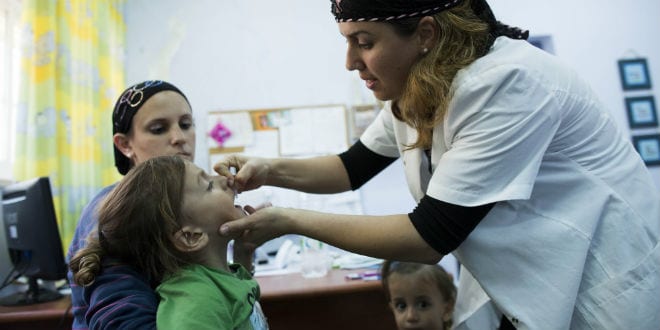The introduction a decade ago by Israel’s Health Ministry of the Prevnar (PCV) vaccine to the immunization schedule of the country’s babies has reduced hospitalizations as the direct result of Streptococcus pneumoniae dipped by a staggering 62%.
Prevnar (pneumococcal 7-valent conjugate) vaccine is used to prevent infection caused by pneumococcal bacteria. Prevnar contains seven different types of pneumococcal bacteria. Pneumococcal disease is a serious infection caused by a bacterium that can infect the sinuses and inner ear and lead to complications.
The vaccine also decreased bacterial resistance to antibiotics, according to researchers at Tel Aviv University who studied Prevnar’s long-term positive effects.
The research was led by Prof. Galia Grisaru-Soen of TAU’s Sackler Faculty of Medicine who heads the pediatric infectious diseases unit at Tel Aviv Sourasky Medical Center. Conducted in collaboration with
Dr. Yael Berger and Dr. Diana Averbuch of Hadassah University Medical Center in Jerusalem, their findings were recently published in the journal Acta Paediatrica.
Streptococcus pneumoniae can cause many types of illnesses, including pneumonia (lung infection), ear infections, sinus infections, meningitis (infection of the covering around the brain and spinal cord) and bacteremia (blood stream infection). Rates of the bacteria being found in the nasal tract and throat in children is about 21% in industrialized countries. Transmission occurs from person to person via contact with droplets in the respiratory system. Viral upper respiratory tract infections, including the flu, can predispose people to pneumococcal infection and transmission, which are most common during the colder winter months.
“Our take-home message to all the parents out there is that vaccines work,” declared Grisaru-Soen. “Introducing PCV into the national immunization program made a huge difference. We saw community-acquired bacteremia, pneumonia and focal infections all decrease. If we continue to administer the vaccine, incidents of community-acquired bacteremia will likewise decrease.”
Grisaru-Soen and colleagues analyzed the medical records of hundreds of patients with childhood community-acquired bacteremia under the age of 18 in three children’s hospitals in Tel Aviv and Jerusalem between 2007 and 2015. According to the study, there were 511,904 pediatric emergency department visits during that time, and 125,922 of those children were hospitalized in these three hospitals.
The researchers then analyzed the figures, assessing hospitalizations that occurred before July 2009 (the pre-vaccine period) and after (the post-vaccine period.) “Hospitalizations as a result of all community-acquired bacterial infections decreased by 22% in the post-vaccine period compared to the pre-vaccine period,” Grisaru-Soen said.
“The proportion of pediatric admissions to the emergency department specifically due to Streptococcus pneumoniae decreased from 86.4 to 32.8 per 100,000 admissions after PCV, which was a relative risk reduction of 62%. These figures are comparable to those in the US in the post-vaccination period.”
The US Food and Drug Administration (FDA) licensed the first pneumococcal conjugate vaccine (PCV7) in that country in 2000, providing protection against infections caused by seven other strains of Streptococcus pneumoniae through four incremental doses administered at the ages of two, four, six and 12 months. In 2010, the FDA licensed PCV13, providing protection against infections caused by six more strains.
In Israel, PCV7 was introduced in the national vaccination program in 2009 and PCV13 in 2010. The vaccine is administered in three doses at the age of two, four and 12 months.
Grisaru-Soen noted that another major advantage of the vaccine has been the reduction of certain antibiotic-resistant pneumococcal infections. “There are now far fewer antibiotic-resistant pneumococcal infections caused by the bacterial strains included in the vaccine. The second generation of Prevnar covers six more strains, so the ones that were not included in the new vaccine are now more prevalent in society. We will soon need another new generation of this vaccine.”
She is now researching the influence of vaccines introduced in past decade on pediatric hospital admissions. “If you decide not to vaccinate your children, you’re not only harming them; you’re harming other kids as well,” she concluded. “Being a part of society means also taking responsibility for the health and welfare of other children who for medical reasons may not be able to be vaccinated.”



